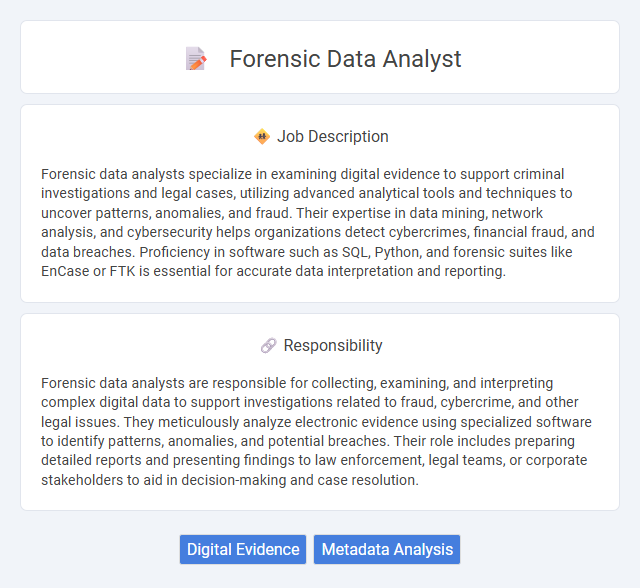
Forensic data analysts specialize in examining digital evidence to support criminal investigations and legal cases, utilizing advanced analytical tools and techniques to uncover patterns, anomalies, and fraud. Their expertise in data mining, network analysis, and cybersecurity helps organizations detect cybercrimes, financial fraud, and data breaches. Proficiency in software such as SQL, Python, and forensic suites like EnCase or FTK is essential for accurate data interpretation and reporting.
Individuals with strong analytical skills and attention to detail are likely to be well-suited for a forensic data analyst role, as the job demands interpreting complex data to identify patterns and anomalies. Those who have a high level of patience and perseverance may find the meticulous nature of forensic investigations manageable, increasing their chances of success. Conversely, candidates who struggle with prolonged concentration or lack interest in data-driven problem solving might face challenges in this field.
Qualification
Forensic data analysts require a strong foundation in data science, cybersecurity, and criminal justice, often demonstrated through a bachelor's degree in computer science, forensics, or information technology. Proficiency in programming languages like Python, SQL, and tools such as EnCase or FTK is essential for analyzing digital evidence. Certifications like Certified Forensic Computer Examiner (CFCE) or GIAC Certified Forensic Analyst (GCFA) enhance credibility and demonstrate specialized expertise in forensic data analysis.
Responsibility
Forensic data analysts are responsible for collecting, examining, and interpreting complex digital data to support investigations related to fraud, cybercrime, and other legal issues. They meticulously analyze electronic evidence using specialized software to identify patterns, anomalies, and potential breaches. Their role includes preparing detailed reports and presenting findings to law enforcement, legal teams, or corporate stakeholders to aid in decision-making and case resolution.
Benefit
A forensic data analyst likely enhances the accuracy of criminal investigations by uncovering critical digital evidence that supports legal cases. They probably contribute to reducing fraud and cybercrime, increasing organizational security and trust. This role may offer strong career growth opportunities and job stability due to rising demand in law enforcement and cybersecurity sectors.
Challenge
Forensic data analyst roles likely involve complex data interpretation challenges that require meticulous attention to detail and strong problem-solving skills. The probability of encountering ambiguous or incomplete datasets may demand advanced analytical techniques and persistence. Navigating legal and ethical considerations could add layers of difficulty, requiring careful judgment and precision.
Career Advancement
Forensic data analysts specialize in examining digital evidence to support legal investigations, combining skills in data mining, cybersecurity, and law enforcement protocols. Career advancement opportunities include senior analyst roles, forensic data consultant positions, and leadership roles in cybersecurity or digital forensics teams. Earning certifications such as Certified Forensic Computer Examiner (CFCE) or GIAC Certified Forensic Analyst (GCFA) significantly enhances promotion prospects and expertise recognition.
Key Terms
Digital Evidence
Forensic data analysts specialize in examining digital evidence to support criminal investigations and legal proceedings. They use advanced analytical tools to recover, preserve, and interpret data from electronic devices, ensuring the integrity and authenticity of digital artifacts. Expertise in cyber forensics and knowledge of legal standards for evidence handling are crucial for success in this role.
Metadata Analysis
Forensic data analysts specializing in metadata analysis play a critical role in investigating digital evidence by examining file properties, timestamps, and communication logs to uncover hidden patterns and establish timelines. Their expertise in parsing metadata from various sources, such as emails, documents, and multimedia files, aids in identifying data manipulation, corroborating facts, and supporting legal proceedings. Proficiency in forensic tools like EnCase, FTK, and specialized metadata extraction software enhances accuracy in reconstructing cybercrime events and ensuring evidentiary integrity.
 kuljobs.com
kuljobs.com